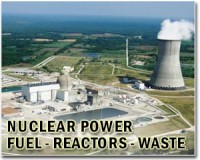 |
New Delhi (AFP) May 7, 2010 India introduced a controversial bill Friday to cap compensation payments in the event of a nuclear accident as opposition MPs accused the government of selling out to US corporate interests. Opposition lawmakers denounced the measure, key to putting into operation a 2008 civilian nuclear agreement with the United States and giving the energy-hungry country access to US nuclear technology. Yashwant Sinha, a senior leader of the opposition Bharatiya Janata Party (BJP), charged the proposed legislation which limits compensation in the event of a nuclear accident was being tabled under US pressure. "It's illegal and unconstitutional," Sinha told parliament. Communist party member Basudeb Acharia condemned the measure as "anti-people." The Civil Liability for Nuclear Damage Bill would put a 110 million dollars cap on compensation that companies operating reactors would have to pay and exempt equipment suppliers. Total liability could reach 450 billion dollars with the government paying the additional sum. Critics have denounced the amount as a pittance. BJP MPs later walked out of the chamber in protest. Opposition MPs said the legislation undercut the rights of potential nuclear accident victims to seek proper compensation. The legislation protects "foreign reactor builders from the weight of the financial consequences of accidents," said Indian political analyst Brahma Chellaney in a recent commentary. The bill's passage is one of the last remaining steps needed to put into effect the India-US civil Nuclear Cooperation Agreement, a key part of the deepening relationship between the world's two largest democracies. US companies have yet to benefit from the agreement while Russian and French rivals have been making headway in the atomic energy market estimated by the US-India Business Council to reach 150 billion dollars over the next 30 years. Lalit Mansingh, former Indian ambassador to Washington, said Russia and France were unconcerned by the absence of the law since their companies were state-owned and in the event of a claim, they are covered by their governments. Critics of the bill point to what they see as light punishment meted out after the 1984 industrial disaster in Bhopal, in which upwards of 10,000 Indians died in a gas leak from the Union Carbide plant.
Share This Article With Planet Earth
Related Links Nuclear Power News - Nuclear Science, Nuclear Technology Powering The World in the 21st Century at Energy-Daily.com
 Anger in Austria over Slovakia nuclear energy expansion
Anger in Austria over Slovakia nuclear energy expansionVienna (AFP) May 6, 2010 An Austrian minister criticised Slovakia Thursday for concluding an environmental study on the expansion of a nuclear power plant without taking into account Vienna's concerns. "It's an affront to Austria and I strongly condemn it," Environment Minister Nikolaus Berlakovich fumed after Bratislava gave the green light to the expansion of the Mochovce plant. "This is not in line with our p ... read more |
|
| The content herein, unless otherwise known to be public domain, are Copyright 1995-2010 - SpaceDaily. AFP and UPI Wire Stories are copyright Agence France-Presse and United Press International. ESA Portal Reports are copyright European Space Agency. All NASA sourced material is public domain. Additional copyrights may apply in whole or part to other bona fide parties. Advertising does not imply endorsement,agreement or approval of any opinions, statements or information provided by SpaceDaily on any Web page published or hosted by SpaceDaily. Privacy Statement |